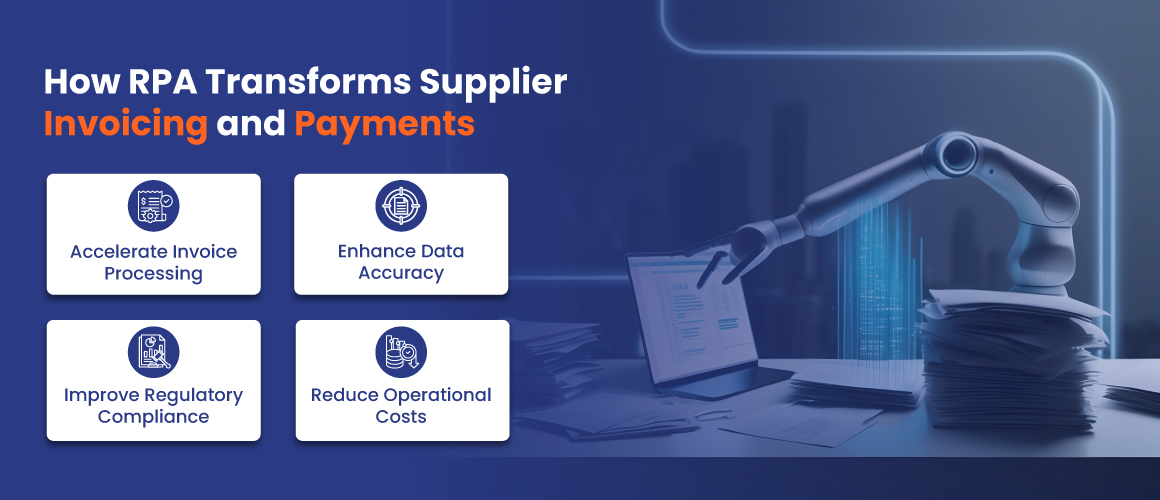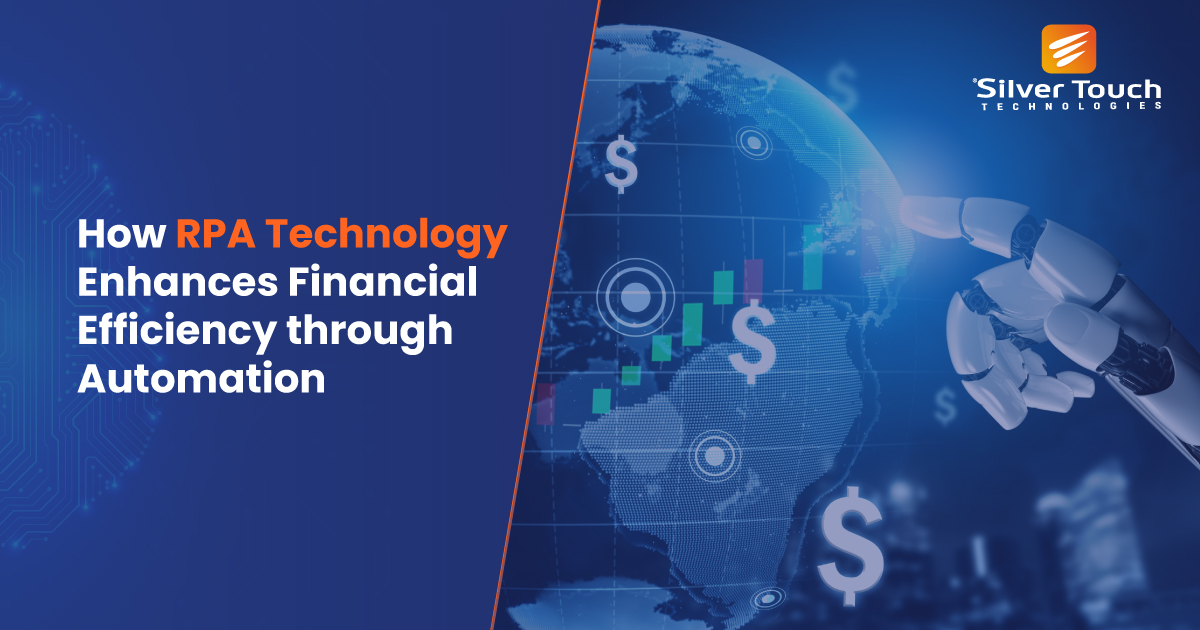Robotic process automation (RPA) has brought revolutionary changes in modern enterprises. Apart from automating several production processes, advancing technology has made it possible to use RPA for financial efficiency. As cutting-edge RPA solutions handle rule-based processes across different departments, including procurement and inventory, the finance department is also no exception!
This blog talks about the role of RPA in accounts payable and supplier invoice processing. We will also make a roadmap of RPA implementation in the finance department. But, before moving ahead, let’s dig deep into some common challenges in supplier invoicing and payments.
Current Challenges in Supplier Invoicing and Payments
These days, many businesses face challenges related to suppliers and payment processes. Some of these challenges are- Manual Data Entry The traditional data entry process requires manual effort for recording and extracting data from different invoice formats. This process is time-consuming and prone to errors.
- Slow Approval System This is a major challenge in the way of approving invoices and initiating the payment process. It leads to unnecessary delays in payment and other related issues.
- Lack of Standardization Many companies have yet to standardize the invoice process. Different formats and layouts with manual data entry can reduce the visibility and transparency of the process.
- Inefficient Invoice Matching It is a cumbersome and error-prone process to match invoices against purchase orders and goods receipts. Human reviews cannot reduce inefficiencies in matching.
Companies can use RPA for financial efficiency to get rid of these challenges. Let’s understand the role of RPA in transforming supplier invoicing and payment processes while addressing these challenges.
How RPA Transforms Supplier Invoicing and Payments
RPA can automate the entire procure-to-pay lifecycle to address challenges of supplier invoicing and payments. Here is how RPA drives transformation in the process

- Accelerate Invoice Processing RPA bots can operate on a 24/7 basis. These bots can extract data from multiple formats of invoices and validate the same against purchase orders. It brings more accuracy, transparency, and efficiency in the invoice processing. As a result, invoice processing time gets reduced from days or weeks to hours.
- Enhance Data Accuracy Automation of data entry and extraction can eliminate the risk of human errors like typos and duplication of entries. RPA can perform a ‘three-way match’ that includes the automatic verification of invoices, purchase orders, and goods receipts. RPA can also flag any discrepancies or inefficiencies.
- Improve Regulatory Compliance The usage of RPA in accounts payable gives companies a comprehensive audit trail for every step, ranging from invoice receipt to payment. It ensures that all processes adhere to compliance and internal policies. This makes audits more reliable and relevant for any regulatory standards.
- Reduce Operational Costs Automation enables organizations to reduce their costs related to invoice processing and approval workflows. Moreover, it can make the accounts payable staff free to focus on more strategic activities like financial analysis. RPA bots can improve accuracy and efficiency to reduce several costs significantly.
You can consult a reputable RPA solution provider to get the customized software bots for managing supplier invoicing and payment processes.
What are the Key Benefits of RPA in Financial Processes?
Implementation of robotic process automation in financial processes offers many business benefits apart from simplifying operations and increasing efficiency. Some of the key benefits of using RPA for financial efficiency include
Better Quality and Auditability
RPA bots follow a set of pre-defined rules to eliminate the risk of human errors in data entry and related calculations. As a result, companies can get more accurate financial statements for auditing and higher-quality data for effective decision-making.
Increased Scalability and Savings
This technology facilitates modern businesses to handle increased transaction volumes without hiring additional staff or investing in infrastructure. Bots are capable of scaling up or down to meet changing business needs. This can reduce operational costs significantly.
Enhanced Supplier Relationships
Quicker approval process leads to on-time payments. This can improve supplier relationships over the period. Moreover, quicker resolution of customer queries can improve the satisfaction ratio to build a loyal customer base.
Improved Regulatory Compliance
Using RPO for invoice processing and other financial activities can increase consistency and accuracy. Companies can maintain prevalent regulations and meet compliance-related requirements effectively.
High ROI and Competitive Edge
RPA can increase financial efficiency and improve vendor relationships. This helps companies achieve a high ROI in a relatively short period. Furthermore, a high customer satisfaction ratio can give businesses a competitive edge.
While RPA offers many business benefits by automating financial processes, it is essential to ensure its effective implementation in the company.
How to Integrate RPA with Existing Systems
Integration of RPA with existing business systems is a complex process that requires a great deal of planning and execution. Unlike traditional, API-based integrations, RPA needs the UI of existing applications. The RPA bot can interact with the system’s screen, keyboard, and even mouse, just like a human user. This approach does not require any change to the application code or database structure. However, the bot development needs careful effort.
Let’s understand this with an example of RPA integration with ERP, like SAP. This process initiates with the bot configuration to log into the SAP system. The RPA development company will program the bot to navigate to a specific transaction code. It makes the bot ready to extract invoice data from an external source, such as an email attachment. Then it pastes the same into the proper field within the ERP’s interface.
After entering the entire necessary data, the bot would simulate clicking the ‘Save’ button to complete the transaction. This seamless process enables businesses to automate tasks within the ERP system.
Implementation Roadmap for RPA in Finance
Let’s make a structured and phased roadmap for successfully implementing RPA in finance. Here are its three phases
Phase 1. Identify Processes and Make a PlanIdentifying repetitive and rule-based tasks in finance is the first step. You should do a feasibility assessment and define clear objectives for implementing RPA in the system.
Phase 2. Develop RPA Bots and TestIt involves the bot design and development processes. Your RPA development partner also performs user acceptance testing (UAT) in a controlled environment with end-users.
Phase 3. Deploy the Bot and MonitorThis is a crucial phase that includes both deployment and close monitoring of a software bot in the production environment. Continuous measurement of results is necessary against the defined objectives.
A reliable and experienced RPA development partner can help you handle the second and third phases efficiently.
Concluding Lines
Many companies have either started using RPA for financial efficiency or are in the process. Higher scalability and better business relationships are some of the apparent benefits of using RPA in accounts payable and other financial activities. However, it is necessary to integrate your software bot successfully into existing systems, including ERP and CRM to leverage its benefits and increase the ROI.
Silver Touch Technologies Canada is a reputable and renowned RPA solutions provider. Our in-house team of experienced professionals can assist you in RPA integration with ERP and in utilizing advanced solutions for automating various processes. Contact us to learn more about our RPA services for different industry sectors.
FAQs
RPA improves supplier invoicing by automating data entry from invoices, validating information against purchase orders, and initiating payment approvals.
RPA can create an auditable trail of automated actions for ensuring that the processes adhere to regulatory mechanisms.
IT support is essential for maintenance and security updates for RPA solutions. However, employees can use RPA solutions easily after having the necessary training.
Yes, RPA can handle large transaction volumes efficiently and accurately on a 24/7 basis.



